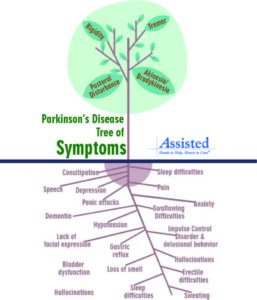Parkinson’s Disease and the Importance of Home Health Care
Parkinson’s Disease (PD) is a progressive nervous system disorder that affects about one million Americans and 10 million people worldwide. That US count is greater than the number of people diagnosed with Multiple Sclerosis, Lou Gehrig’s disease, and Muscular Dystrophy combined. The condition ordinarily begins in middle or late life, and the risk increases with age, with most being diagnosed at around age 60 and up.
In the early stages of the disease, the following warning signs may occur: The arms may not swing when walking. There may be a loss of smell. Speech may become soft or slurred. Handwriting may become smaller and more crowded together. Other symptoms include resting tremors, stiffness, and dizziness.
Parkinson’s disease has over 50 symptoms, many of which are invisible, or non-motor, as shown in the graphic below.
The signs and symptoms can be different for everyone. The symptoms are not only diverse but change and increase over time. Symptoms often begin on one side of your body and usually remain worse on that side, even after symptoms begin to affect both sides. Other symptoms include slow movement, balance problems, swallowing, chewing, eating problems, bladder issues, constipation, and pain in specific areas or throughout the body.
Sufferers can also experience non-motor symptoms such as depression and anxiety, which are less visible. Since they are not seen, non-motor symptoms are often misunderstood and hard to talk discuss. Yet they can significantly affect relationships, social life, and overall quality of life than the more apparent symptoms. Other non-motor symptoms include hallucinations, delusions, dementia, and excessive daytime sleepiness or other sleep disturbances.
PD breaks down neurons, cells that are the core of our central nervous system, the body’s electrical grid. It mainly affects nerves producing the neurotransmitter dopamine, a substance allowing the electrical transfer of messages from one nerve cell to another or from a nerve cell to a muscle. When dopamine levels decrease, it causes abnormal brain activity, leading to impaired movement and other symptoms of the disease. PD not only disrupts brain networks that control movement but also those linked to mood, behavior, and thinking. It can also affect working memory, decision-making, staying attentive, and concentration.
Though the cause of PD is unknown, researchers have found that men are 1.5 times more likely to have PD than women. In addition, women’s experiences with PD differ from men’s. They have longer times between onset of first symptoms and diagnoses and between symptom appearance and first visit to a movement disorder specialist. In addition, women may experience more non-motor symptoms and are more likely to be single or widowed, while men are more likely to rely on a spouse as their primary caregiver. When the symptoms get too overwhelming or challenging to manage on your own, our trained nurses, caregivers, and therapists can lend a helping hand. Although Parkinson’s disease can’t be cured, medications might significantly improve symptoms. Occasionally, the doctor may suggest surgery to regulate certain regions of your brain and improve symptoms.
Here are some questions to consider regarding your patient or loved one:
1. Have you seen signs of decline in any way, including the early warning signs mentioned above?
2. Have you observed problems swallowing? Have they developed pneumonia, or are they at risk of falling? Assisted’s Skilled therapists help relieve pain, help functional limitations, limit fall risks, help with daily activities, increase the ability to swallow, and help patients communicate personal needs.
3. Are they transitioning to a new stage and may need caregiver, therapy, or hospice services? Assisted can provide non-medical assistance and support to ensure all your loved one’s needs are met, regardless of their physical or cognitive limitations. We also have understanding and knowledgeable hospice staff who can help ease the pain and increase the comfort of a patient and their family through the end stages of a patient’s progression.
It can become more challenging to care for a Parkinson’s patient as the condition progresses. Early stages can be manageable, but as the disease advances, symptoms become more debilitating. Assisted can help you determine the correct stage and best manage symptoms as time goes by. Assisted Home Health & Hospice staff is also trained to work with patients with a wide range of conditions that may cause pain or discomfort. In addition, we can provide support in the form of nurses, caregivers, physical therapists, and other medical professionals to help clients with Parkinson’s Disease and help them live with dignity and respect in the comfort of their own homes. To learn how Assisted’s home health services can help you or your loved one, call us today at (800) 949-6555 or visit our website at www.AssistedCares.com.
Note: Check out our new Parkinson’s Disease Pinterest board at this link: https://www.pinterest.com/assistedhealth/parkinsons-disease/








